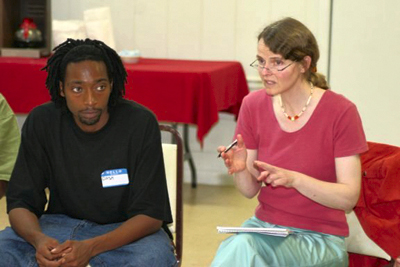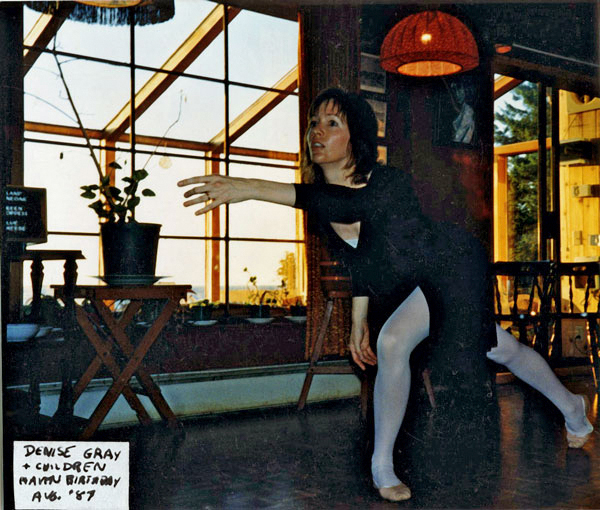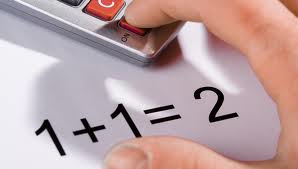A Gestalt Experiment
By Cindy O’Dell.
Cindy is a registrar at The Haven. Skills 3: Gestalt Plus is coming up soon, Feb 11–14, with Jane Olynyk and Wayne Dodge. register@haven.ca
The idea came up in a program recently of doing a daily session of gestalt. I decided to take up the challenge and for a year, see its effect on my world. Since I was also in the process of teaching myself to write a play I imagined the practice of daily dialogue, while presumably therapeutic, would also be good training for a playwright. So here I am, three months later checking in with the intention of sharing aspects of my process. I chose to write down my sessions as I wanted to keep track. And I determined my commitment would have a better chance of enduring if I stayed with a practice I’d already been using, as I’ve consistently journalled for 35 years.
Research provided further back up for sticking to it. Gestalt therapy,* I read, was apparently helpful in liberating unfinished business, nurturing unrealized potential, and centring myself in my world, three factors which, if I’d had the awareness, would’ve been at the top of a personal wish list compiled when I first started journaling. Might have saved me from writing stale restatements of the same old unfinished business year after year. And maybe not. Some themes reappear again and again. We’re all fated to work through certain aspects of our natures over and over and over and over and over and over and over. But I might be a different person if I’d reinforced the hopeful gestalt message that I could be “reaching new positions with less vulnerability to ill effects and greater resiliency in renewing myself.”
CP: Oh well, here I am.
CDAR: Ya, if you’d only done that, years ago.
CP: I said I’m here now, aren’t I?
CDAR: Nice quote, at least.
My first inclination was to identify internal conversations. I already talk to myself so I just had to be more aware of the different voices and then give them the opportunity to really speak. Often I had a central personality (CP) who chimed in. I named the others as they identified themselves: Curious, Witness, Slug, Get-things-done, Weird, Ill One, Low Energy, Can’t-do-anything-right (CDAR), Knowing, Reaction, Eye of the Needle, Soft, Victim, Un-included, In-crowd, Me, Her, World Weary, Paranoid, Clarity, Put-it-all-together, The Writer, etc. Some times I would use a person when I still had things to say when there was no opportunity for physically checking in. And often the characters from my play, Toni and Elliot, would make contact.
Apparently, all experience hangs around until I’m finished with it. And that can tie up a lot of my energy. Incomplete themes, though, do seek completion, and thankfully can even play themselves out. Until they do, I can get totally preoccupied, compulsive, and self-defeating. But who doesn’t have hidden and incomplete agendas interfering with their everyday lives? Most of us have a large capacity for unfinished situations. It certainly wasn’t difficult coming up with subject matter. I felt energized, through practicing what I’d probably never have the courage nor the competence to say in person. And eventually it did help clear out some of the junk in my head. And I’ve had a breakthrough with one very incomplete relationship dynamic.
Yes, I have made contact. Interesting that was never my intention when I started this project. I know The Haven is all about transformational, relational living but ironically I’ve always been wary of contact and suspicious of hidden and incomplete agendas that always seemed to get projected onto me.
CP: Which I know is a projection in itself.
CDAR: If you know it so well, then why do you buy in as much as you do?
CP: Because I have my own hidden and incomplete agendas.
CDAR: Well … maybe one day you’ll get that “the return from unconsciousness follows restoration of contact.”
CP: I am getting it. Nice quote, dingle berry.
So, I had a series of gestalt dialogues with my sisters which led to actual conversations that weren’t replicas of those I had with my internal sisters. In other words, I wasn’t aiming for an outcome. Still, the practice led to the opening up of old unfinished family business. Unexpectedly, the combination of the fantasy dialogues and the actual conversations moved me to contact my brother, with whom I’ve almost always been estranged. I sent him a birthday card. I didn’t expect any contact offered in return. I was actually ashamed of my lack of compassion for him and I was trying out a new behaviour. But he responded. And we have a date to meet up soon.
Gestalt practice can lead to actions which create an expanded dialogue with my own nature as well as with others. And I’m slowly recovering a sense of myself in action. Eventually, after a few months of a daily gestalt practice, I found it wasn’t necessary to do it every day. More important was recognizing the symptoms related to unfinished business and in doing so strengthen my self-supportive muscle to lean in. I may be awkward, vulgar, and strange (even more so) as I try out previously alien and resisted actions, however I now know the difference and hopefully I’ll be less likely to pigeon-hole or stereotype myself. So if I do seem awkward, vulgar or strange please assume I’m practicing “a dynamic re-alignment of intrapersonal material” and slowly whittling down barriers to contact.
CP: Nice quote!
******************
* “More than intrapersonal dialogue gestalt therapy can include enactment, improv, psychodrama, fantasy, process psychology, dreamwork as well as other methods.” All quotes are from Gestalt Therapy Integrated by Erving and Miriam Polster.







